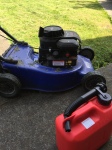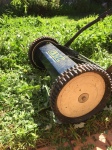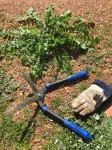Archive for September, 2015
Lessons from a Lawnmower
Yes that’s right. today’s blog is about how a lawnmower can share insights about coaching and how you might be undermining yourself.
At the moment as I write we are experiencing the beginning of Spring. Which also means the start of the season in which everything in the garden grows and grows. It’s also the season when we realise that the lawnmower has sat idle and unused in the garden shed for many months. In my case, well over a year as I have been paying someone to cut my lawns for a while. 
My lawns had grown and were out of control as I have not been happy with the most recent lawnmower guy (he compared my lawns to those of a neighbour saying I needed to do what they have done and sow my lawns – when he was referring to a neighbour who had re-turfed their lawns! There is a large and visually obvious difference between recently turfed and recenly sown lawns.) in whom I had lost confidence and comfort with paying him to cut my lawns.
So here I am with a big task ahead of me (weeds and grass at least 4 inches high) and doubt in my mind because the best tool – the lawnmower – has sat unused for a long period of time.
Reference One – how often do we do this to ourselves at work, thinking that we will be unable to effectively tackle something because it has been so long?
Now I’ve also succumbed to a lurgy at the end of winter which had me doubting my physical capacity to pull start the mower. We all know how exhausting those things can be. don’t we?
Reference Two – we base our expectations of effort and anticipated effort on what has happened in the past rather than an accurate and fact based assessment of the current situation.
Me feeling some self doubt plus the assumption that a mower not used for a long time would be hard to start led me to conclude that it would not start. This was supported by the fact that my fuel can had been damaged and I knew I had no petrol for the mower. And so I gave up before I had even tried.
Reference Three – all too often people give up on a task before assessing it realistically let alone trying
And here is where it all gets interesting.
I decided that the lawn had to be mowed and that I did not want to use the same guy who had been doing it in the past. And therefore (oddly) that led to a belief that I ought to do it myself (not call another lawnmower person) and based on the fact that I knew that I had a manual push mower in the garden shed.
 Yes one of those old, outdated, hard to find manual, hand push mowers that have metal blades and no catcher. A steel handle and a tendency to jam – especially when trying to plough through weeds that are as high as the wheels of the push mower. The blades kept jamming and I had to keep stopping to un jam them and it was really had manual labour to push that mower through the weeds and grass.
Yes one of those old, outdated, hard to find manual, hand push mowers that have metal blades and no catcher. A steel handle and a tendency to jam – especially when trying to plough through weeds that are as high as the wheels of the push mower. The blades kept jamming and I had to keep stopping to un jam them and it was really had manual labour to push that mower through the weeds and grass.
As you can see from this photo. Now let me also say that my total lawn area is probably the size of 1.5 tennis courts. That’s a lot of square metres of greenery to be pruned or mowed. In fact I had weeds that were so big  that it seemed more sensible to pull them out whole or to clip them with the hedge shears.
that it seemed more sensible to pull them out whole or to clip them with the hedge shears.
My neighbours must have had a good giggle at me on my hands and knees cutting greenery with shears rather than using a mower.
One neighbour, and only one, commented that “Gee, that looks like a good workout” while all the others who saw me said nothing. They probably think I am insane or have a problem that results in me doing things manually.
Reference Four – beware of the assumptions that you make when you observe others doing things that seem unusual or unexpected
Now I am not really crazy – although I did persist in mowing almost half my total lawn area with the hand mower before taking the other mower o a friend and asking for some help to check that it would start. And guess what? Two pulls on the starter, we checked and confirmed that it was totally out of fuel. Perhaps evaporation or perhaps that I’d put it away when empty the last time it was used. No drama, let’s fill it with petrol and see what happens.
So, with a bit of fuel and following proper start procedure the mower started on the second pull. Yes that’s right. After at least 18 months of being idle and untouched, all it took was a little fuel and proper procedure for the motor mower to start.
Reference Five – sometimes it takes less input than we think to get something started.
The moral of this post? Please do not allow yourself to fall victim to the same set of assumptions, beliefs and limits that I show in this story when you are at work or working with people. Make good use of the critical friend who can:
- Make sure you follow a good process to get things going
- Ask if you have tried things rather than allowing your assumptions to limit you
- Encourage you to give it a go even if you have doubts
- Believe in you and your dusty skills at times when you may think that they have passed their use by date
And so the lawnmower is now my personal analogy for how I can make sure I remain open to coaching and mentoring in the same way that I ask my clients to allow me to coach and mentor them.
It may not be the perfect story for all situations as there are genuinely circumstances where old and unused skills have become rusty and redundant – that’s where a coach can help you establish if they are genuinely out of date or if you are limiting yourself. It’s too easy for us to limit ourselves.
Now I shall complete my lawn mowing with the motor mower. (insert happy face perhaps?)
Read Full Post | Make a Comment ( None so far )
Goal Setting vs Goal Achievement and Progress Measurement
So much is written about the process for goal setting and all sorts of tools, tips and guidance has been given. And yet many of us continue to struggle to achieve our goals – even when they are SMART or SMARTER. A well respected person in my network, Dr Stephanie Burns gained a PhD in Goal Achievement and she found that well written or well crafted goals are not enough – the true key to success is taking action. In fact just doing something that is one step closer to the goal is more important than the wording of the goal.
I suppose a comparison could be that a poor plan that is acted on is far better than a perfectly crafted plan that never gets applied. So ease up your focus on writing perfect goals and ramp up your focus on taking action towards those goals.
Most of us are also well versed in the need to measure and monitor our progress and activity. And that is why I am writing this post.
Today while at the gym I had an insight to how we can all too easily trip ourselves up in our action taking. Let me explain.
Working out on the treadmill I was taking good notice of the stats and my progress. Time, pace, distance and calories burned – not that I was really interested in that, I’m building stamina and fitness so it’s all about pace over distance and the time I take to cover that distance. And that got me thinking about how to best record my workout – I keep a workout diary.
Yet I also have a fitbit device which also records steps per day.
And I also have an app on my phone that tracks when I run or walk outside of the gym.
That means that I have at least three if not four (including the tracking capability of the equipment at the gym). My insight was that this could be confusing and at best complicated while I invest extra effort to link and correlate the data.
The insight? How often do we do this to ourselves at work and in our careers?
To some degree multiple points and sources of feedback are helpful as this creates a multi dimensional and complete picture.
However my question to you is how much data and feedback is too much? At what point do you draw the line and put a limit on the amount and sources of feedback that you receive.
It is time to take control of your goals, your actions and your progress measures.
Absolutely you need to have a goal – for without a purpose or something to move toward you will be at the mercy of whatever forces and currents surround you, like a leaf on a river – moving, making progress but at the whim of external forces and never in control of your direction or outcomes. Relaxing though it may be, in fact I have had yoga instructors encourage me to relax and imagine that my spine is floating like a leaf on a river. Yes, an example of how something can be helpful in one context and not in a different one.Hmm, sounds familiar to me and helpful in a way that says one size/solution does not fit all circumstances.
The purpose of this post is to remind you of two key success factors that you must keep in mind about achieving and reaching your goals.
The first is that a goal is important and the actions associated with and connected to that goal are more important.
Secondly, and perhaps more importantly, be alert to where you are getting feedback and progress measures from and make sure you are informed rather than confused by the feedback you are seeking.
If you are unsure about how much feedback you need or what value of the feedback you are getting has, then perhaps a mentor or coach can help you get some clarity.
Too much data does not necessarily equal information. Information is data presented in a useful, helpful and usable way.
When you are focusing on your goals remember to take consistent and aligned action and to measure your progress without being overwhelmed or confused by what you are being told.
Read Full Post | Make a Comment ( None so far )

